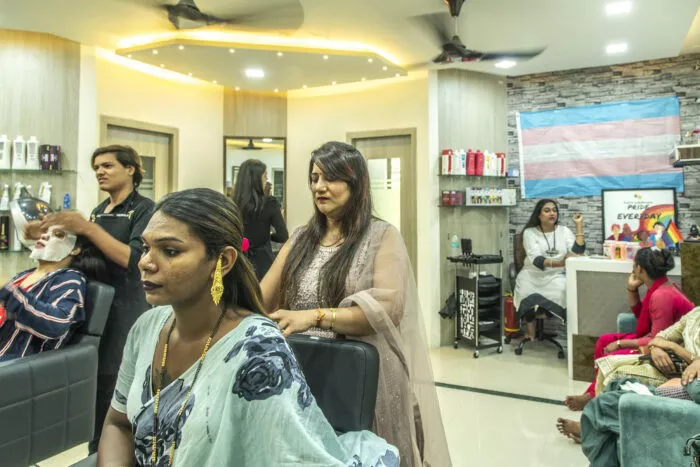In a suburb of Mumbai, a unique beauty salon named Transformation has opened its doors, specifically supporting the transgender community.
Kamal, a 44-year-old transfeminine individual, has struggled for acceptance from her family for 22 years. “As the only child and son, my parents expected me to be the ‘man of the house,'” she said. Lacking family support, Kamal couldn’t finish her education and worked as a bar dancer and sex worker to survive. These were the only places where she could freely express her gender identity.
In early 2023, Kamal joined the staff of Transformation, the first beauty salon run by the transgender community in her district. Located in Kalyan, a city near Mumbai, this salon is the first place where Kamal feels safe and can be herself professionally.
Creating Sustainable Livelihoods
Transformation Salon was established through the EpiC project, led by FHI 360 and funded by PEPFAR and USAID. The EpiC project partners with governments and community-based organizations to manage national HIV programs. It supports hundreds of organizations that design and deliver HIV programs tailored to their communities.
Transformation is an example of how community-based organizations are developing sustainable funding models, reducing reliance on donor and government funding. By earning their own revenue, these organizations gain autonomy in meeting community needs and providing HIV services to those most in need.
Kinnar Asmita, a nonprofit supporting transgender people around Mumbai, partnered with EpiC to start the salon. EpiC provides resources to help organizations start small businesses, enabling people like Kamal to earn a living and contribute to their communities.
Neeta Kene, the founder of Kinnar Asmita, said, “Until now, we relied on government funds. We always dreamt of having our own business.”
Members of Kinnar Asmita and the local trans community were involved in every step of establishing Transformation. The salon offers services to everyone, regardless of their identity, with all beauticians and hairstylists identifying as part of the trans community.
The salon provides hair, nail, and makeup services, and plans to add laser hair removal. It also aims to generate additional revenue by selling beauty products and offering courses and home-based beauty services.
“In Kalyan, we have created a social enterprise that uplifts the transgender community and bridges community divides,” said Sumita Taneja, country representative for EpiC India. “This effort will protect and improve many layers of health—financial, physical, and mental.”
Opening Safe and Inclusive Pathways
Transformation is about more than economic opportunities; it’s about creating a safe and inclusive environment, bringing respect and dignity to the trans community.
At other salons, Kamal explained, “sometimes [transgender people] are charged double, given late appointments, or turned away.” When she applied to other beauty salons before working at Transformation, employers insisted she dress as a man, claiming customers wouldn’t be comfortable with a trans person working there.
As the receptionist at Transformation, Kamal greets all customers as herself. She schedules appointments, explains services, collects payments, and promotes the salon. With EpiC’s support, she completed a beautician training course and now provides beauty services to customers.
Kamal hopes Transformation’s impact will grow. “I wish many branches of Transformation open,” she said, “and that the trans community across Mumbai can access beauty services with the respect and dignity they deserve.”


